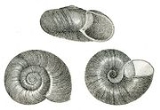
Haplotrematidae
Encyclopedia
Haplotrematidae is a taxonomic family
of predatory air-breathing land snail
s, terrestrial
pulmonate gastropod mollusks in the superfamily Rhytidoidea
.
land snails. They occur from Alaska
, through coastal Canada
, and as far south as northern Mexico
, but they are predominately snails of the eastern and western United States
.

The structure of the radula
of these snails (their "teeth") is unusual. Essentially, haplotrematids have fewer cusps than most snails, but they are considerably elogated, suitable for the predatory life they follow. Members of this family have been given the common name "lancetooth" snails, presumably based on this last anatomical characteristic. Their sole food source consists, as far as is known, of other terrestrial mollusks.
In this family, the number of haploid chromosome
s lies between 26 and 30 (according to the values in this table).
Family (biology)
In biological classification, family is* a taxonomic rank. Other well-known ranks are life, domain, kingdom, phylum, class, order, genus, and species, with family fitting between order and genus. As for the other well-known ranks, there is the option of an immediately lower rank, indicated by the...
of predatory air-breathing land snail
Land snail
A land snail is any of the many species of snail that live on land, as opposed to those that live in salt water and fresh water. Land snails are terrestrial gastropod mollusks that have shells, It is not always an easy matter to say which species are terrestrial, because some are more or less...
s, terrestrial
Terrestrial animal
Terrestrial animals are animals that live predominantly or entirely on land , as compared with aquatic animals, which live predominantly or entirely in the water , or amphibians, which rely on a combination of aquatic and terrestrial habitats...
pulmonate gastropod mollusks in the superfamily Rhytidoidea
Rhytidoidea
The Rhytidoidea are a superfamily of air-breathing land snails and slugs, terrestrial gastropod mollusks in the informal group Sigmurethra.This taxonomy was based on the study by Nordsieck, published in 1986...
.
Distribution
These are North AmericanNorth America
North America is a continent wholly within the Northern Hemisphere and almost wholly within the Western Hemisphere. It is also considered a northern subcontinent of the Americas...
land snails. They occur from Alaska
Alaska
Alaska is the largest state in the United States by area. It is situated in the northwest extremity of the North American continent, with Canada to the east, the Arctic Ocean to the north, and the Pacific Ocean to the west and south, with Russia further west across the Bering Strait...
, through coastal Canada
Canada
Canada is a North American country consisting of ten provinces and three territories. Located in the northern part of the continent, it extends from the Atlantic Ocean in the east to the Pacific Ocean in the west, and northward into the Arctic Ocean...
, and as far south as northern Mexico
Mexico
The United Mexican States , commonly known as Mexico , is a federal constitutional republic in North America. It is bordered on the north by the United States; on the south and west by the Pacific Ocean; on the southeast by Guatemala, Belize, and the Caribbean Sea; and on the east by the Gulf of...
, but they are predominately snails of the eastern and western United States
United States
The United States of America is a federal constitutional republic comprising fifty states and a federal district...
.

Shell description
Their shells vary in size from small (7 mm in diameter, or about 0.3 inches) to medium (32 mm, about 1.3 inches), usually with a low, flattened spire, a very wide umbilicus, and usually with the upper lip margin (at the aperture) curving downwards or straightened.Anatomy
They have a number of anatomical peculiarities.The structure of the radula
Radula
The radula is an anatomical structure that is used by molluscs for feeding, sometimes compared rather inaccurately to a tongue. It is a minutely toothed, chitinous ribbon, which is typically used for scraping or cutting food before the food enters the esophagus...
of these snails (their "teeth") is unusual. Essentially, haplotrematids have fewer cusps than most snails, but they are considerably elogated, suitable for the predatory life they follow. Members of this family have been given the common name "lancetooth" snails, presumably based on this last anatomical characteristic. Their sole food source consists, as far as is known, of other terrestrial mollusks.
In this family, the number of haploid chromosome
Chromosome
A chromosome is an organized structure of DNA and protein found in cells. It is a single piece of coiled DNA containing many genes, regulatory elements and other nucleotide sequences. Chromosomes also contain DNA-bound proteins, which serve to package the DNA and control its functions.Chromosomes...
s lies between 26 and 30 (according to the values in this table).
Genera
Genera within the family Haplotrematidae include:- AncotremaAncotremaAncotrema is a genus of air-breathing land snails, terrestrial pulmonate gastropod mollusks in the family Haplotrematidae.This genus is sometimes considered to be merely a subgenus of Haplotrema...
H. B. Baker, 1931 - HaplotremaHaplotremaHaplotrema is a genus of predatory air-breathing land snails, terrestrial pulmonate gastropod mollusks.This genus is the major genus in the terrestrial snail family Haplotrematidae.These carnivorous land snails are widely distributed in North America....
Ancey, 1881 - ZophosZophosZophos is a genus of air-breathing land snails, terrestrial pulmonate gastropod mollusks in the family Haplotrematidae.- Species :Species within the genus Zophos include:* Zophos baudoni * Zophos concolor Férussac...
Gude, 1911

